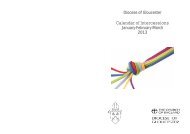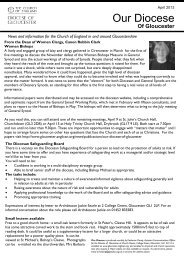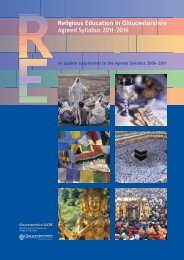How to give good supervision - Diocese of Gloucester
How to give good supervision - Diocese of Gloucester
How to give good supervision - Diocese of Gloucester
You also want an ePaper? Increase the reach of your titles
YUMPU automatically turns print PDFs into web optimized ePapers that Google loves.
<strong>Diocese</strong> <strong>of</strong> <strong>Gloucester</strong><br />
The First Four Years<br />
Appendices: Resources<br />
8 Supervision<br />
6. Process <strong>of</strong> <strong>supervision</strong><br />
Supervision can include: giving information (i.e. clarification) ; <strong>of</strong>fering <strong>of</strong> support and encouragement;<br />
being challenging; being cathartic; giving both positive and negative feedback. It is important <strong>to</strong> avoid<br />
collusion, either in ignoring a particular area, or issue. Modelling honesty and openness, and inviting<br />
honest feedback and questions about one’s own practice <strong>of</strong> ministry can help this.<br />
7. Outcomes <strong>of</strong> <strong>supervision</strong><br />
Supervision is intended <strong>to</strong> be transformative. An indication <strong>of</strong> this is that an agreed note should be<br />
made at the end <strong>of</strong> the <strong>supervision</strong> <strong>of</strong> the subject and any learning goals achieved or identified as a result<br />
<strong>of</strong> the conversation.<br />
You should not ask <strong>to</strong> see the journal, but having it there it will root the discussion in reality. Examples<br />
<strong>of</strong> discussions are <strong>of</strong>fered in the Helping the Helpers handout. You should be ready <strong>to</strong> listen, probe,<br />
engage, and share your own experience honestly as a way <strong>of</strong> enabling the curate <strong>to</strong> learn and grow in<strong>to</strong><br />
their vocation.<br />
8. Boundaries<br />
Keeping <strong>good</strong> boundaries reaps real rewards in <strong>supervision</strong>: timekeeping, confidentiality and a personally<br />
informed pr<strong>of</strong>essionalism will provide a <strong>good</strong> foundation for a worthwhile partnership.<br />
9. Supervision for all<br />
To <strong>of</strong>fer <strong>good</strong> <strong>supervision</strong>, a person needs <strong>to</strong> be receiving <strong>supervision</strong> themselves. (Advice on this may<br />
be taken from the Direc<strong>to</strong>r <strong>of</strong> Curate Training.)<br />
10. Prayer<br />
Remember <strong>to</strong> pray for your curate – both when you are with them, and when you are alone.<br />
Additional Notes: how <strong>to</strong> receive <strong>good</strong> <strong>supervision</strong><br />
Curates need <strong>to</strong> take responsibility for their side <strong>of</strong> all <strong>of</strong> the above points. They need <strong>to</strong> ensure that<br />
diary time is set aside, and that they make adequate preparation for the <strong>supervision</strong>. They must be ready<br />
<strong>to</strong> talk about themselves – and <strong>to</strong> expect their incumbent <strong>to</strong> be ready <strong>to</strong> be disclosive (but not subject<br />
<strong>to</strong> <strong>supervision</strong>: responsibility in the relationship is not equivalently two-way). Supervision is at the heart<br />
<strong>of</strong> formation in ministry: it is the responsibility <strong>of</strong> all members <strong>of</strong> the training partnership <strong>to</strong> ensure that<br />
it happens.<br />
John Witcombe July 2009<br />
<strong>How</strong> <strong>to</strong> <strong>give</strong> <strong>good</strong> <strong>supervision</strong> 2

















